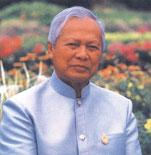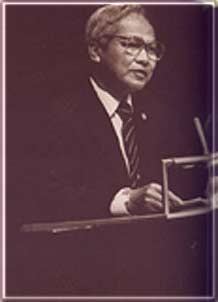 generalprem.com
generalprem.com
Authorized Biography
Thai Biography
Positions & Ranks
Important Milestones
The Statesman Foundation
The Traidhos Foundation
Prem Tinsulanonda • Center for International Education
Keynote Speeches
General Prem's Private Photo Gallery
News Updates
Information in German
Links

|
Sufficiency
Economy: His Majesty’s Philosophy for Development
By
H.E. General Prem Tinsulanonda
At the Leadership Forum 2001 Mr.
Chairman, Thailand now finds herself at another defining moment of her economic destiny. Swept over by tidal waves of the financial crisis nearly four years ago, we, luckily, are up, back on our feet – though still gasping for breath. As we pick up the pieces, some soul-searching may be in order, and along with it, a search for a new way. It is, therefore, a great honor for me to be here among such a distinguished audience at the Leadership Forum 2001. It is even a greater honor for me to speak on the “Sufficiency Economy” as an enlightened way forward, as a feasible approach to achieving the common objective of a stable, equitable, and durable development for all the people and communities in our land. As you are aware, Sufficiency Economy is a philosophy, graciously bestowed on us by our beloved Monarch, His Majesty the King. For three decades before the crisis, Thailand was one of the few economies growing at the fastest rates in the world. Income per head stood at almost 3,000 dollars in 1996, a big leap from less than 700 dollars in 1980. But the severity of the crisis went far beyond the bounds of our imagination and experience. Our people, our communities have suffered greatly especially those lacking the resources and social protection to fall back on – the unemployed, the poor, small businesses, and marginal farmers. We have yet to recover fully from the painful loss and dislocations. We have yet to regain fully our sense of dignity, self—respect, and confidence which have severely diminished in the drawn—out process of adjustment. Ladies and Gentlemen, Since the crisis, globalization has often been seized upon by some as the ready scapegoat for the havoc in its wake. In this new era, borders have indeed become less significant. Trade, investment and capital are able to move virtually freely worldwide, creating a new international environment directed and driven by the more or less unfettered market forces. This has rapidly led to an increasingly integrated global economy, conferring benefits on countries that have proven adept at taking advantage of opportunities, but globalization, at the same time, carries with it great risks ready to exact heavy punishment from countries which are caught unprepared or treat it lightly. Thailand, having benefited greatly during the previous three decades of rapid growth, let down its guard and left itself badly exposed to those risks. Market forces, whose purpose is the maximization of profits, could not care less who was to suffer or become bankrupt. Countries, large and small, can be highly vulnerable to external shocks, be it volatility in capital flows, contagion risk, export competitiveness, and exchange rate risk. The severe over-reliance of our private sector on short-term, foreign currency denominated loans became our undoing. At the end of 1996, it reached the unprecedented height of 70 billion US dollars. The country’s economic success and the enabling environment following the country’s liberalization policy and the dismantling of capital controls attracted the massive capital flows. Such flows were a double-edged sword. While it fueled the burgeoning economic growth, it also engendered latent hazards in the mounting current account deficits. The exit of capital flows proved faster than its entry, following the “herd behavior” in the loss of investor confidence, which led to the severe liquidity and currency crises. Globalization, in my mind, can be a force for good and is above all a stark reality that cannot be wished away, nor can it be stopped. The task of integrating ourselves into the new global environment makes it imperative for us to find a way to make the most of the opportunities while shielding ourselves from the negative aspects of globalization. Ladies and Gentlemen, Domestically,
the seeds of failure had already been sown well before the fateful
month of July 1997. Economic growth, higher incomes, and material
accumulation were being pursued increasingly as ends in themselves.
The volumes, variety and speed of economic and financial activities
and services expanded at a breakneck pace. Impressive sky-high
buildings transformed the landscapes of many cities and towns
in Thailand. Sky-high corporate profits and salaries, and conspicuous
consumption were being confused with economic development itself,
as were prestige projects and prestigious material trappings. Thailand was living far beyond its means, with economic development being defined and understood too narrowly, which resulted in extremes and excesses. As I said, these were, for the greater part, financed by the huge flows of short-term foreign borrowings. Opportunities were squandered when borrowed capital was channeled into non-productive sectors. The needed sense of self-reliance and prudence as collective social values seemed to have been gradually cast aside. I have long held the view that poverty is the root of all problems facing our nation, and most of my life in public service has been dedicated to the task of alleviating poverty, in the firm belief that it would help solving each and every one of those problems. But this crisis made the yawning gap between the haves and have-nots widen even further, against a background of searing costs and disappearing social warmth. Unrelenting quest for material wealth seemed to have undermined compassion and caring, which in turn weakened the social fabric, community bond, and traditional values. Ladies and Gentlemen On
the brighter side, I fully agree with those who say that we
have managed, with many personal sacrifices and despite the
social cost, to achieve a turn-around from the 1997 crisis.
But, clearly, we should draw some lessons from our unhappy experience.
We simply cannot go on with our old ways and old habits as if
nothing had happened. I
do not pretend to have a full grasp of the principles involved
in all their profundity and intended intricacies, but I do know
that it is surely in our best interest to make the effort, however
modest, to understand and draw inspiration from the wisdom of
His Majesty. Sufficiency Economy has as its thrust “the middle path as the overriding principle for appropriate conduct by the populace at all levels”. The middle path, when practiced at the level of the individuals, families and communities, as well as collectively in the choice of a balanced national development strategy, will provide a firm foundation for all in standing up to the trials and challenges of today’s world. It means moderation in all human endeavors, reining in expectations to within the bounds of self-support and self-reliance, having enough to live on. It lessens human proneness to the extremes and excesses, both in our insatiable appetite for wealth and wasteful consumption, which marked the period leading up to the crisis. Sufficiency Economy does not advocate isolationism but presupposes the inevitable process of increasing global interdependence. What it does envisage and promote is the way towards a smoother, and more successful, integration of the Thai economy into the sweeping and stormy process of globalization. Moderation could be the means by which the sail of interdependence can be trimmed and adjusted so as to prevent the boat from being capsized by over-dependence. We all have seen how over-dependence made us extremely vulnerable to the whims of international capital, which, on its part was not immune to the influence of herd behavior. Knowledge is and integral component of Sufficiency Economy. Our successive Chakri Kings have over the centuries placed great importance on learning from the outside world in ensuring the survival and the modernization of our country. Today the acquisition of knowledge, not just in the sciences and the technologies but also of other nations’ experiences in development and reforms, continues to play a central role in capacity building and in charting the course of our own national development. Here, his Majesty urges prudence in the application of knowledge, “in particular, great care is needed in the utilization of untested theories and methodologies for planning and implementation”. The question, which I have often asked myself in this connection, albeit with the benefit of hindsight, is whether we have been a little too unquestioning and a little too fast in embracing forces of the market from outside? Could we have been more discriminate and selective in our approach? Sufficiency Economy seeks to strengthen the symbiosis and harmony between man and his natural environment. The crisis has brought into sharp focus His Majesty’s lifelong work in agriculture and conservation, built up over the years with a great number of the Royally initiated projects. Agriculture, the mainstay of the majority of the Thai population who are still toiling in poverty, can serve as a buffer against external shocks, testifying to the value of “getting back to basics”. For too long, the growth-oriented strategy has led to the rapid depletion of environmental assets priced cheaply at below their replacement cost. Conservation is but an integral part of sustainable development. His Majesty has truly been teaching us by example, be they His projects to restore watershed areas through reforestation, or to reverse desertification or to harness the sometimes-destructive forces of nature such as flooding, benefiting at the same time from power generation and irrigation. Towering
above all else as a constant in any overall equation is the
need “to strengthen the moral fiber of the nation, so that
everyone, particularly public officials, theorists and businessmen,
adheres first and foremost to the principles of honesty and
integrity”. It is true that at times people were badly
demoralized on being turned into paupers overnight. Each, out
of necessity, went his own way, caring little, if at all, for
his fellow men. Moral fiber gradually reinforced, contributed
to the collective national resilience, and seemed to be the
single most important factor that kept us afloat and pulled
us through the crisis. His Majesty’s “Sufficiency Economy” was timely in pointing the way forward. It gave heart to His people when they were in dire need, and was so well received that it now provides the foundation for the formulation, now in progress, of the Ninth National Economic and Social Development Plan (2002-2006). Beyond the national context, the international community at the Tenth United Nations Conference on Trade and Development (UNCTAD) has acclaimed “Sufficiency Economy” in February 2000, which expressly recognized His Majesty as “the Developer King”. There is perhaps no better way to conclude my presentation than to repeat the tribute paid to His Majesty in the Statement of the Conference, and I quote “This remarkable resilience reflects the strength of the Thai nation. And that strength has been nurtured and developed by His Majesty King Bhumibol Adulyadej, the King of Thailand, who is the soul of his nation. Through his caring leadership, His Majesty has earned the abiding love and profound respect of his people, and through his thinking he has laid the foundation for and inspired his country’s development strategy. His Majesty’s philosophy of a “sufficiency economy” now lies at the heart of Thailand’s development thinking… The experience of Thailand offers fundamental lessons to all of us and the Thai nation is living testimony to the efficacy of the King’s actions and boundless compassion.” |
